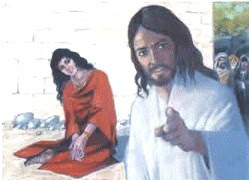 Readings: Is 43:16-21; Phil 3:8-14; Jn 8:1-11
Readings: Is 43:16-21; Phil 3:8-14; Jn 8:1-11
I’ve really grown to love celebrating the Eucharist in the Health Care Center’s dining room. It’s the simplest of services—no music and just one minister who reads the first reading and helps with the distribution of the Eucharist. It definitely counts as a no-frills service. Yet there can be such warm and marvelous (and humorous) touches to it. One such moment that moves me is saying the Our Father together. The elderly participants try with the barest of gestures to make an attitude of prayer. Some hold their hands open; others reach out and take someone else’s hand (Pat and Margaret Moriarty are good at that); one elderly lady reaches over and grabs on to a chair or table if no other person is near. It’s a very heart-warming moment. I mentioned that one time to Pat Moriarty. He replied: "Father, when you are as old as I am, you got a lot that needs to be forgiven." In today’s gospel story I don’t think he would have been one of those who picked up a stone.
This gospel story usually gets interpreted as an instance of Jesus’ great forgiveness....to the woman taken in adultery. However, one could make a good case that the story is really about recognizing the need for forgiveness, especially for those who don’t think they need it. After all, we really know nothing about the woman’s state of mind; we have no idea if she felt any need for forgiveness; we don’t even know how she reacted to Jesus’ forgiveness of her. But the scribes and Pharisees in this story didn’t reflect much about their own need for forgiveness;
they were ready to launch headlong into a condemnation and perhaps execution of the woman taken in adultery. Jesus reminds them of their own need for God’s forgiveness, which, in their rush to condemn someone else, they had forgotten.
The need to suspend judgment of others was one of the great goals of the early desert monks. They realized that the battle against rash judgment constitutes one of the greatest challenges for people (including monks), and one does not easily conquer the tendency. One of the most profound insights in the desert tradition is recognizing that each of us tends to build a wall around ourselves. That wall is composed of the various pieces that we consider to be descriptive of a moral person (good, generous, sharing, etc.); it also contains the pieces that we think go into the definition of holiness (prayerful, quiet, devout, etc.). This wall serves as a protection that we hide behind to fire out at those who disagree with us. The key here is realizing that the wall is something we have become comfortable with. Things that don’t fit into our wall we have a tendency to attack.
This tendency is described succinctly in one of the stories of the Desert Monks. There was one desert monk who came to visit Abba Arsenius, an old man famed for his holiness. After his visit he met another monk who asked him how the visit went. The visitor wasn’t happy; he said that it didn’t seem to him that Abba Arsenius was practicing a serious asceticism at all. The monk then asked the visitor what he did before becoming a monk. He responded: "I was a shepherd; I slept on the ground and ate sparse meals." "Ah," the monk said, "Arsenius was a tutor in the imperial family. He used to dine on sumptuous foods, drink fine wines and sleep on silken sheets. The simplicity of the desert is a great change and hardship for him." The visitor’s wall got a piece chipped out of it.
Another step is breaking down that wall of judgment is recognizing (really acknowledging) that there are many different ways of holiness. The desert monks told a story about that too. A visitor went to see several of the more famous desert monks. One of them edified him greatly with his silence; the second shocked him by offering him some honey cakes to eat. He left refusing to partake of them. On leaving he saw a vision—a river with two boats in it; in the first knelt the one monk in complete silence and in the other the second monk with his friends eating honey cakes. And there were angels delighting in both of them." This gospel story
challenges us to examine our judgments of each other.
Sunday, March 21, 2010
Fr. Matthias Neuman's Homily for the 5th Sunday in Lent
Subscribe to:
Post Comments (Atom)




1 comment:
i really like the last story. thanks for sharing.....
jennifer vance
Post a Comment